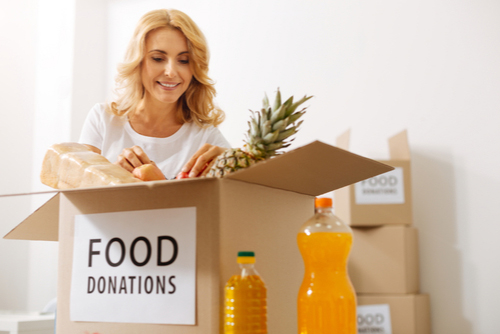Quarantine. Pandemic. Social distancing. These words have all become a regular part of our vocabulary as the Coronavirus spreads. Along with the terminology have come sweeping changes in the way we live our daily lives and many people are beginning to feel the impact. Stores and restaurants are closing, supermarket shelves are bare and finding toilet paper or hand sanitizer is nothing short of a miracle at this point. Combined with the stress of limited social contact, feeling cooped up at home and the trauma of it all, tensions are running high and finding ways to cope can be difficult. At The Guest House in Ocala, Florida, we’ve put together some tips to help you endure self-quarantine and face trauma in these difficult times.
Staying Connected with Others
 Around the globe, social distancing, quarantine and shelter-in-place have become common as we deal with COVID-19. While these measures help to prevent the spread of Coronavirus, it has left many of us feeling isolated and lonely. We are naturally social beings — we celebrate together when times are good and depend upon each other for support when they’re not — and social isolation can make it difficult to cope with stress and uncertainty. As more of us are working from home and staying in, technology lets us stay connected with our friends, family or co-workers and get in some valuable face-to-face contact.
Around the globe, social distancing, quarantine and shelter-in-place have become common as we deal with COVID-19. While these measures help to prevent the spread of Coronavirus, it has left many of us feeling isolated and lonely. We are naturally social beings — we celebrate together when times are good and depend upon each other for support when they’re not — and social isolation can make it difficult to cope with stress and uncertainty. As more of us are working from home and staying in, technology lets us stay connected with our friends, family or co-workers and get in some valuable face-to-face contact.
- The video chat features of your smartphone and apps like FaceTime, Skype, Facebook Messenger or Google Hangouts provide valuable face-to-face contact that makes remote communication more personal, allowing you to see facial expressions and body language.
- Other options include Zoom, a video conferencing app often used for virtual meetings and conferences, and the more casual Houseparty, which allows friends and family to join group video chats complete with games and additional features like screen share.
Not everyone is tech-savvy, however. In places like Italy and Spain, neighbors have been communicating with each other on balconies or through open windows, talking, singing and playing music to keep their spirits up. These interactions show how we can connect with those around us in new and imaginative ways, helping us stay positive and healthy. Even a simple phone call to check in your loved ones can make a difference, providing much needed support from a familiar voice.
Coping with Trauma

This is a difficult and traumatic time for everyone, but those who have been through trauma before might have a harder time adjusting. Social isolation, a disruption of normal activity and a fear of the Coronavirus can increase stress and anxiety, especially with the added layer of trauma. Combined with the uncertainty of how events will play out over the following weeks or months, it can become too much. If you or someone in your life is a trauma survivor or suffers from PTSD, it’s important to recognize the risk of becoming reactive and lashing out, but there are ways you can minimize the impact of Coronavirus-related stress and promote a healthy frame of mind.
- Practice mindfulness. During times like this, it’s important to practice mindfulness and live in the moment. All too often, we spiral into despair by catastrophizing our situation and convincing ourselves that things are worse than they really are.
- Focus on what you can control. So much is out of our control right now, but focusing on what you can control can help you stay calm and centered. Stay healthy by getting enough sleep and eating well, make your home a place of comfort and relaxation, and get your news or information from reputable sources. Although it’s important to stay informed with important updates, try to avoid obsessing over the news to prevent unnecessary stress.
- Be patient. This is a difficult time for everyone and we all process things differently. If you or your loved one suffers from trauma, it may take more time to adjust as life is impacted by the Coronavirus. Exhibit strength and reassurance to help yourself and others stay strong and remember that your current situation is temporary.
- Utilize technology. Many providers offer telehealth and virtual care options for doctor visits, therapy, counseling and more. Now is a good time to become familiar with this technology to make alternate arrangements for you or your loved one’s treatment.
If you or your loved one are feeling overwhelmed or need more support, don’t hesitate to reach out for help. Your friends, family or therapist can be a great source of strength and comfort during this time and help you manage your stress or anxiety more effectively. It’s more important than ever to prioritize your health and taking care of your emotional and mental health needs can have a lasting impact on your overall well-being.
Supporting Each Other
 If you are feeling healthy and able, there are plenty of ways you can help your friends, family and neighbors who may be having a hard time due to factors like trauma and anxiety. Help them stock up on essential household items, stay healthy and stick to a regular routine. You could also help with indoor activity planning to alleviate boredom and establish an exercise routine or meal plan to stay in shape. If you don’t live together, make an effort to stay connected and check-in on them daily to see how they’re doing. If they aren’t familiar with video chat software or smartphone apps, teaching them how to use these services can go a long way in reducing the stress of feeling isolated. These actions are just examples of some of the things that you can do to make a significant difference in someone’s life right now and make coping with all of the ongoing changes just a little bit easier. Remember, we’re in this together.
If you are feeling healthy and able, there are plenty of ways you can help your friends, family and neighbors who may be having a hard time due to factors like trauma and anxiety. Help them stock up on essential household items, stay healthy and stick to a regular routine. You could also help with indoor activity planning to alleviate boredom and establish an exercise routine or meal plan to stay in shape. If you don’t live together, make an effort to stay connected and check-in on them daily to see how they’re doing. If they aren’t familiar with video chat software or smartphone apps, teaching them how to use these services can go a long way in reducing the stress of feeling isolated. These actions are just examples of some of the things that you can do to make a significant difference in someone’s life right now and make coping with all of the ongoing changes just a little bit easier. Remember, we’re in this together.
The Guest House Ocala is a treatment center for mental health, addiction and self-defeating behaviors that manifest due to trauma. Our range of proven therapies and renowned team of experts make us uniquely qualified to help our guests heal with highly individualized care that goes above and beyond.
Call 855-253-2964 today for more information on our treatment programs.